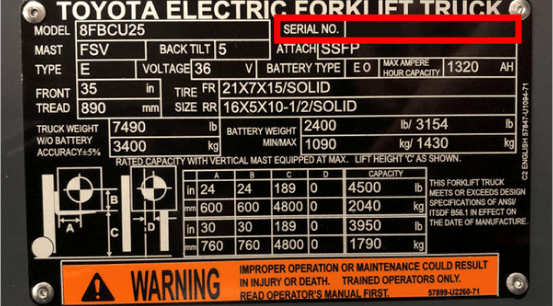How to Find Your Equipment Model Number.
Finding the right parts for your equipment is easy when you have your model and serial number which can be found on the data plate. Luckily, a forklift data plate is installed on every truck on the market to help you understand what your forklift can do and provide vital information.
Model Number: The model number of your toyota forklift is extremely important for relaying information to your dealers about repair or technical assistance and for looking up replacements part!
Serial Number: The serial number on your lift is the most important number.The model serial number combination will allow us to provide you with the parts that will fit your particular piece of equipment.

How to Find Your Equipment Serial Number
Finding the right parts for your equipment is easy when you have your model and serial number which can be found on the data plate. Luckily, a forklift data plate is installed on every truck on the market to help you understand what your forklift can do and provide vital information.
Model Number: The model number of your toyota forklift is extremely important for relaying information to your dealers about repair or technical assistance and for looking up replacements part!
Serial Number: The serial number on your lift is the most important number.The model serial number combination will allow us to provide you with the parts that will fit your particular piece of equipment.

Need some help? For further assistance or more information, contact your local Toyota Dealer.

Please click below to sign in to your MyToyota account
Don't have an account?

Where would you like to go?
Three Ways To Maintain Safe Forklift Use Throughout The Year

We’ve been counting down to National Forklift Safety Day, excited to share its important message. While Toyota Forklifts is sure to spend this month celebrating safe forklift use, we understand that forklift safety is a practice that calls for year-round commitment from all of us, operators and pedestrians alike.
The best way to ensure a safe work environment where forklifts are in use is to have a plan for both your operators and your facility. Here are three ways you can maintain safe forklift use in your facility year-round.
Properly Trained Operators
It’s required by law (OSHA Regulation: 29CFR1910.178(l)) for forklift operators to be trained before legally operating a forklift. Why is training so important? According to the National Safety Council, 70% of all industrial accidents are caused by operator errors. According to OSHA, proper training may reduce accident rates by 25-30%.
Even after forklift operators are trained and ready to work, the employer must reevaluate each operator every three years to make sure their skills are up to par. It is also the responsibility of employers to make sure that each operator has the proper training on every kind of equipment they use (e.g. being trained to operate a sit-down counterbalanced forklift does not mean you’re trained to operate an order picker). Only trained operators who have read and understood the operator’s manual should operate forklifts.
Know Your Forklift and Facility
Forklift operators should know the ins and outs of every forklift they operate as well as when and where the forklift can and will be used. They should conduct daily pre-operation inspections and be familiar with a forklift’s warning signs for malfunction.
Operators should also be familiar with the facility they’re working in and should be evaluated in the actual environment where they will be using the forklift as part of their operator safety training.
Be Aware of Your Surroundings
Pedestrians in areas where forklifts are operating share the responsibility of maintaining a safe environment. Know the designated walkways. Wear safety goggles and/or closed-toe shoes when required. Understand that a forklift operator may not be able to see you.
Establishing a culture of awareness and communication within your facility will go a long way in ensuring an all-around safer operation. Have a question about forklift operator safety training or maintaining safe forklift use in your facility? Your local Toyota Forklift Dealer will be happy to assist you in getting the information or training you need.